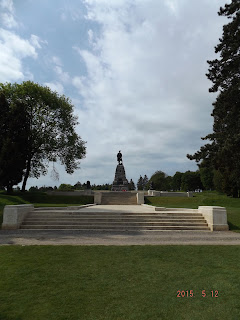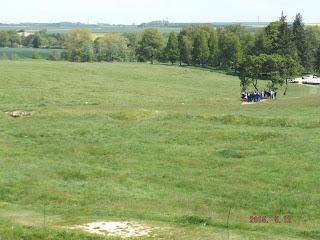The Newfoundland memorial at Beaumont-Hamel is well worth a visit.
http://www.cwgc.org/find-a-cemetery/cemetery/79000/BEAUMONT-HAMEL%20(NEWFOUNDLAND)%20MEMORIAL
https://en.wikipedia.org/wiki/Beaumont-Hamel_Newfoundland_Memorial
It has a self guided walk around the battlefield that illustrates the problems faced by the soldiers, the orders given and the response to them very well. The small museum, though, gives pause for thought as the history of the Newfoundland governments and churches is illustrated.
As the war started, the government asked for volunteers, and the ministers preached war from their pulpits. Young men were promised glory and a future. Promises were made of care for their families while they were away. It happened.
But as the wounded and traumatised veterans returned, although at first government money was available, as soon as economic pressures arrived, then the government money stopped. The churches stepped in at first, but as money became short for them, then those same men encouraged to war from the pulpit were abandoned to fend for themselves.
It can seem easy to send others to war. It is easy to make arguments for strong action in the world. Those who argue for such intervention, should ensure that they are ready to commit to those who survive, for their lifetimes. It is, in my view, an indictment on our nation that care for our veterans is done by charities.
The role of churches in supporting intervention is tangled. Again, if anyone encourages another to fight, then they must be ready to support families and veterans whatever. Yet should a faith that is build on God's forgiveness and reconciliation ever encourage war? The stand out case for 'yes' is the battle against Nazism - but that meant allying with the similarly evil regime of Stalin's USSR, that killed far more of its own people than Nazi Germany. The case for 'no' is strengthened by the messiness of international politics - but it has to be an active 'no'. The church has to be the Spirit led prophetic voice, that challenges the greed, self interest, petty nationalism, jingoism, and prejudice of the march to war. The church should stand against these things every day. The church should properly support a full education that empowers people to ask the difficult questions of our leaders. The church (especially those with privileged access to national leaders) should be demanding answers and holding to account. The church should be working to increase links across national boundaires, and seeking to grow understanding between people.









































No comments:
Post a Comment